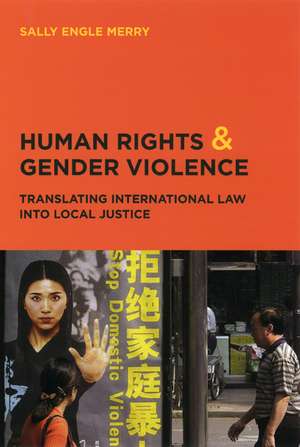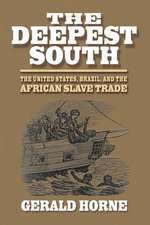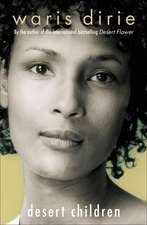Human Rights and Gender Violence: Translating International Law into Local Justice
Autor Sally Engle Merryen Limba Engleză Paperback – 15 dec 2005
Human rights law and the legal protection of women from violence are still fairly new concepts. As a result, substantial discrepancies exist between what is decided in the halls of the United Nations and what women experience on a daily basis in their communities. Human Rights and Gender Violence is an ambitious study that investigates the tensions between global law and local justice.
As an observer of UN diplomatic negotiations as well as the workings of grassroots feminist organizations in several countries, Sally Engle Merry offers an insider's perspective on how human rights law holds authorities accountable for the protection of citizens even while reinforcing and expanding state power. Providing legal and anthropological perspectives, Merry contends that human rights law must be framed in local terms to be accepted and effective in altering existing social hierarchies. Gender violence in particular, she argues, is rooted in deep cultural and religious beliefs, so change is often vehemently resisted by the communities perpetrating the acts of aggression.
A much-needed exploration of how local cultures appropriate and enact international human rights law, this book will be of enormous value to students of gender studies and anthropology alike.
As an observer of UN diplomatic negotiations as well as the workings of grassroots feminist organizations in several countries, Sally Engle Merry offers an insider's perspective on how human rights law holds authorities accountable for the protection of citizens even while reinforcing and expanding state power. Providing legal and anthropological perspectives, Merry contends that human rights law must be framed in local terms to be accepted and effective in altering existing social hierarchies. Gender violence in particular, she argues, is rooted in deep cultural and religious beliefs, so change is often vehemently resisted by the communities perpetrating the acts of aggression.
A much-needed exploration of how local cultures appropriate and enact international human rights law, this book will be of enormous value to students of gender studies and anthropology alike.
Preț: 267.82 lei
Nou
Puncte Express: 402
Preț estimativ în valută:
51.26€ • 55.70$ • 43.09£
51.26€ • 55.70$ • 43.09£
Carte tipărită la comandă
Livrare economică 21 aprilie-05 mai
Preluare comenzi: 021 569.72.76
Specificații
ISBN-13: 9780226520742
ISBN-10: 0226520749
Pagini: 264
Dimensiuni: 152 x 229 x 23 mm
Greutate: 0.4 kg
Editura: University of Chicago Press
Colecția University of Chicago Press
ISBN-10: 0226520749
Pagini: 264
Dimensiuni: 152 x 229 x 23 mm
Greutate: 0.4 kg
Editura: University of Chicago Press
Colecția University of Chicago Press
Notă biografică
Sally Engle Merry is professor in the Department of Anthropology and the Institute for Law and Society at New York University. She is the author of several books, including Colonizing Hawai‘i: The Cultural Process of Law and Getting Justice and Getting Even, the latter published by the University of Chicago Press.
Cuprins
Acknowledgments
1. Introduction: Culture and Transnationalism
2. Creating Human Rights
3. Gender Violence and the CEDAW Process
4. Disjunctures between Global Law and Local Justice
5. Legal Transplants and Cultural Translation: Making Human Rights in the Vernacular
6. Localizing Human Rights and Rights Consciousness
7. Conclusions
Notes
References
Index
1. Introduction: Culture and Transnationalism
2. Creating Human Rights
3. Gender Violence and the CEDAW Process
4. Disjunctures between Global Law and Local Justice
5. Legal Transplants and Cultural Translation: Making Human Rights in the Vernacular
6. Localizing Human Rights and Rights Consciousness
7. Conclusions
Notes
References
Index
Recenzii
“A great contribution to our understanding of the interaction of international human rights norms and local culture. Sally Engle Merry succeeds in showing the complexity of this relationship through a solid grounding in a great deal of field research.”
“In this fascinating and important book, Sally Engle Merry provides an extraordinary account of the complex articulations of bureaucracy, policy, and local culture around the issue of violence against women. Human Rights and Gender Violence makes a convincing argument for taking seriously the notion of local cultures and provides a model for how context, translation, values, and the particulars of social and institutional life can be given consideration.”--Donald Brenneis, University of California, Santa Cruz
"Merry provides an excellent model of how to conduct multi-sited fieldwork in a deterritorialized world, demonstrating how ethnography permits engagement with the fragments of a larger global system. . . . Wonderfully clear and engaging writing."
"This excellent text offers an orientation and a starting-point for more explorations of the contradictory possibilities and limits of the human rights system."
"A book that should be read by every sociologist interested in globalization, international law, or human rights."
"This is an important book that should receive extensive attention. . . . [It] makes major contributions not simply to studies of human rights and gender violence, but also to our knowledge of law, globalization, culture, and power in a world where transcultural ideas have an important capacity to promote change, but only through the processes by which they are mobilized, translated, and appropriated."
"Merry does an invaluable service by marrying a broad methodological prescription for the analysis of human rights issues to a multi-layered discussion of diverse, compelling cases. Indeed, Merry's lucid writing, diverse tiers of analysis and insightful case studies ensure that this book is appropriate for both scholars and undergraduates with even a passing interest in human rights, ethnography or contemporary women's activism. In the end, the book provides a forcefull call to enlist the nuanced tools of cultural anthropologists and others familiar with non-western law and politics in the service of a spirited defense of the continued political vitality and impact of universal rights law."
"A significant contribution to the study of gender-oriented violence in the context of global north and global south dialogues for the advancement of universal human rights."
"A valuable contribution to our thinking about international human rights, both because it examines in empirical detail the interaction between the transnational culture of human rights and alternative cultural discourses in specific contexts and because it acts as a corrective to oversimplified assumptions about the meaning of international human rights and the meaning of culture."











